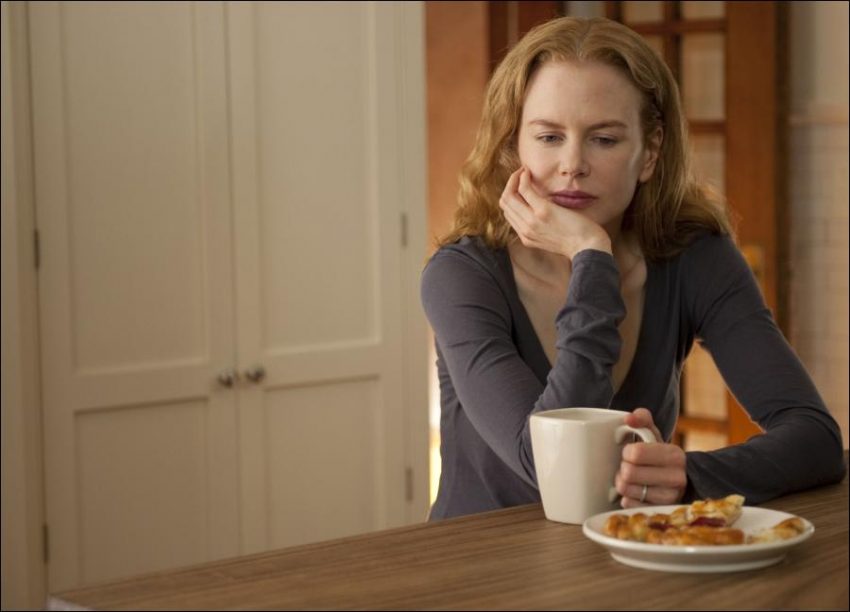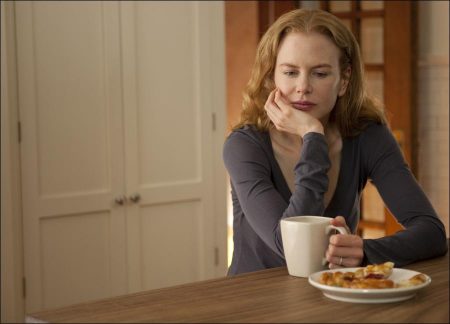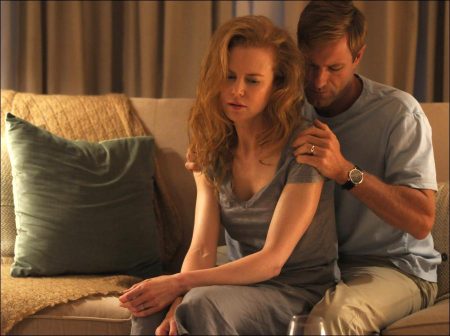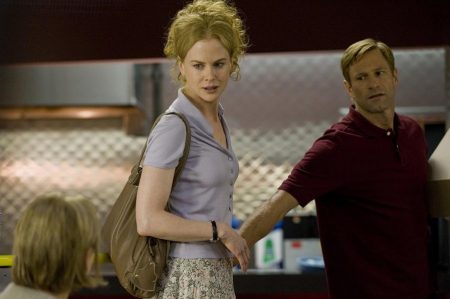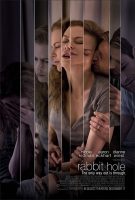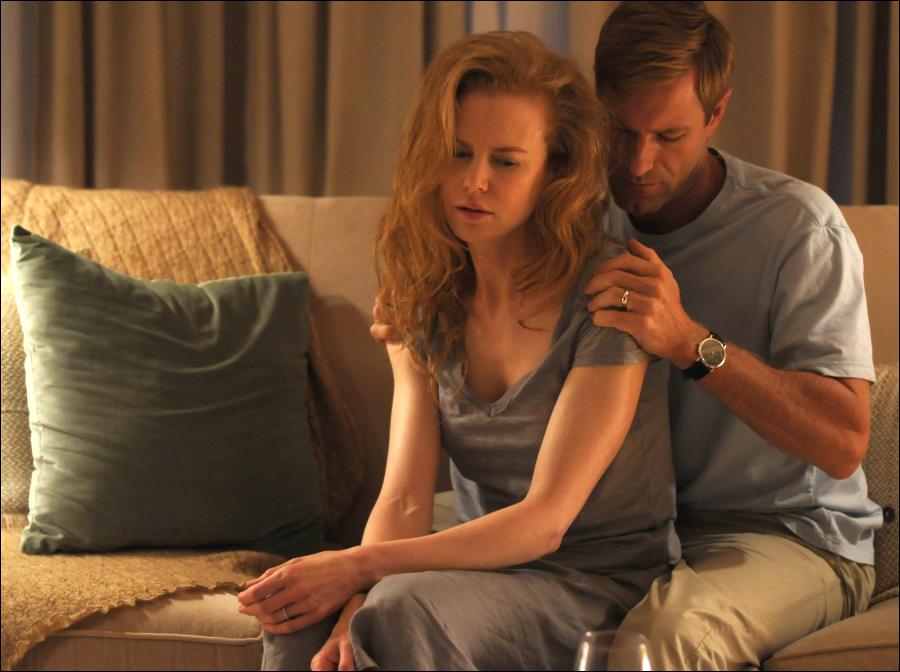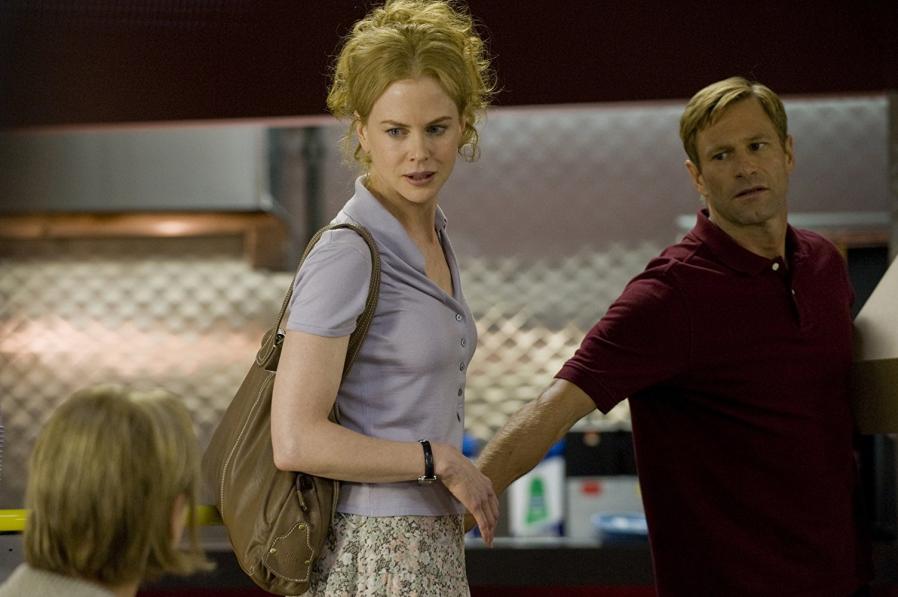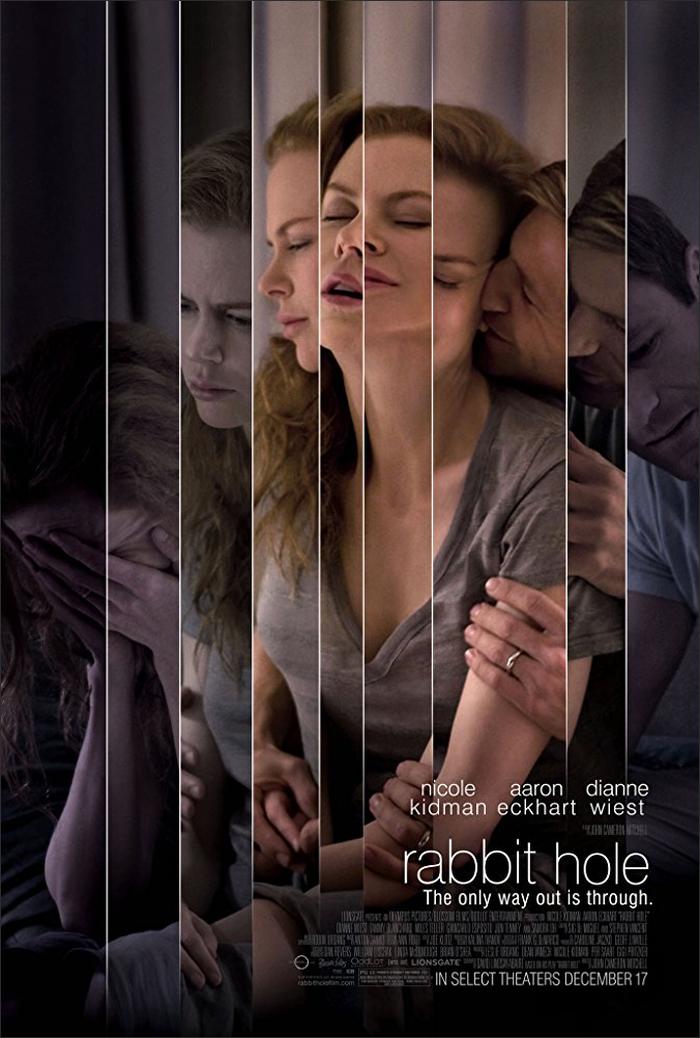Taglines: The only way out is through.
Becca and Howie are still dealing emotionally with the accidental death of Danny, their four year old son and only offspring, eight months after the fact. Danny died by being run over when he ran out onto the street chasing after his dog. Becca and Howie are finding that they need different mechanisms to cope. They have been attending a support group, Becca who is openly hostile toward the group, not wanting to turn out like Gabby and Kevin who have been attending the sessions for eight years, or like the couple that relates everything about their experience to their religious beliefs.
Becca seems to be erasing anything physical that reminds her of Danny, including wanting to move, while Howie wants those physical touchstones, even wanting the dog back which they got rid of after the accident but which he still loves and knows Danny loved. Outwardly, Howie wants their life to return to some normalcy, including resuming a sexual relationship, while Becca seems to be having more difficulties doing so as she will not even reach out to one friend she knows wants to provide support but doesn’t know how to make that first step.
It may not help Becca’s psyche that her irresponsible unmarried sister Izzy is having an unplanned baby. And Becca cannot handle it whenever her and Izzy’s mother Nat tries to provide comfort, especially relating stories about the heroin overdose death of Becca and Izzy’s brother Arthur eleven years ago. Despite loving each other, Becca and Howie’s marriage may not be able to to survive these differences. The way they individually cope may change when each experiences something that they don’t tell the other. For Howie, it’s learning something about Gabby and Kevin. And for Becca, it’s spotting Jason, the high schooler who was the driver of the car that hit Danny.
Rabbit Hole is a vivid, hopeful, honest and unexpectedly witty portrait of a family searching for what remains possible in the most impossible of all situations. The film is directed by John Cameron Mitchell (Hedwig and the Angry Inch) from a script by acclaimed playwright David Lindsay-Abaire, adapted from his Pulitzer Prize-winning play.
The cast, led by Academy Award winner Nicole Kidman (The Hours, Actress in a Leading Role, 2002) and Golden Globe nominee Aaron Eckhart, includes two-time Oscar winner Dianne Wiest (Hannah and Her Sisters, Actress in a Supporting Role, 1986; Bullets Over Broadway, Actress in a Supporting Role, 1994), Tammy Blanchard, Miles Teller, Giancarlo Esposito, Jon Tenney and Sandra Oh.
The film premiered at the 2010 Toronto International Film Festival in September 2010. Lionsgate distributed the film.[5] The plot deals with a couple struggling to heal after the death of their young son. Kidman was critically acclaimed for her performance as Becca Corbett and received Academy Award, Golden Globe Award, and Screen Actors Guild Award nominations for Best Actress. It received a limited release in the United States on December 17, 2010 and expanded nationwide on January 14, 2011.
Film Review for Rabbit Hole
In “Rabbit Hole,” Becca and Howie are trying their best to get on with things. This is the tricky and very observant story of how a married couple is getting along, eight months after their 4-year-old ran out into the street and was struck dead by a car. They were leveled with grief. Their sex life stopped. They lived for a time in a daze, still surrounded in the house by the possessions of the child who no longer lives there.
But their lives are no longer a daily agony. Life is beginning again. “Rabbit Hole,” based on an acclaimed play by David Lindsay-Abaire, occupies the drafty spaces between the cliches of this situation. Becca (Nicole Kidman) and Howie (Aaron Eckhart) are rattling unhappily in an emotional emptiness. As a couple, they attend a group therapy session for mourners, and Becca finds it’s a room full of self-righteous therapy addicts, while Howie finds a sympathetic ear in Gaby (Sandra Oh). And that’s just what he finds ― an ear. He finds someone who can hear him, and he feels he must have been speaking past Becca.
She is also not hearing her mother (Dianne Wiest) or a younger sister (Tammy Blanchard). She’s not even on good terms with the dog. Sadness for her has settled into discontent. As a couple, they’ve reached that point of touchiness where nothing ever seems to be the right thing to say. What makes John Cameron Mitchell’s film so interesting is that it bravely investigates what you say then.
I know all this sounds like a mournful dirge, but in fact, “Rabbit Hole” is entertaining and surprisingly amusing, under the circumstances. The film is in a better state of mind than its characters. Its humor comes, as the best humor does, from an acute observation of human nature. We have known people something like this. We smile in recognition.
I was interested in Nicole Kidman’s performance. I’ve always believed her to be talented, since all those years ago when she and Thandie Newton starred in the wonderful “Flirting” (1991). She seems to be two people: the glamorous star of “Moulin Rouge” and “Nine,” and the risky, daring actress in “Birth,” “The Hours” and “Eyes Wide Shut.” Celebrity has clouded her image; if she were less glamorous, she would be more praised. Age will only be an asset to her.
Here she plays the character who changes; she’s the balance point of the story. Howie has things that happen in his life, but he essentially remains the same man. Becca is troubled and disturbed beyond the depths created eight months ago, and “Rabbit Hole” is about how she’s pulled by inner tides.
The wonder is that Mitchell and David Lindsay-Abaire’s screenplay see her confusion fairly clearly. Apart from anything else, “Rabbit Hole” is a technical challenge. It is simple enough to cover the events in the story, not so simple to modulate them for humor and even warmth. I knew what the movie would be about, but I was impressed by how it was about it.
Rabbit Hole (2010)
Directed by: John Cameron Mitchell
Starring: Nicole Kidman, Aaron Eckhart, Dianne Wiest, Miles Teller, Tammy Blanchard, Sandra Oh, Giancarlo Esposito, Patricia Kalember, Giancarlo Esposito, Ali Marsh, Yetta Gottesman, Roberta Wallach
Screenplay by: David Lindsay-Abaire
Production Design by: Kalina Ivanov
Cinematography by: Frank G. DeMarco
Film Editing by: Joe Klotz
Costume Design by: Ann Roth
Set Decoration by: Diana Salzburg
Art Direction by: Ola Maslik
Music by: Anton Sanko
MPAA Rating: PG-13 for mature thematic material, some drug use and language.
Distributed by: Lionsgate Films
Release Date: December 17, 2010
